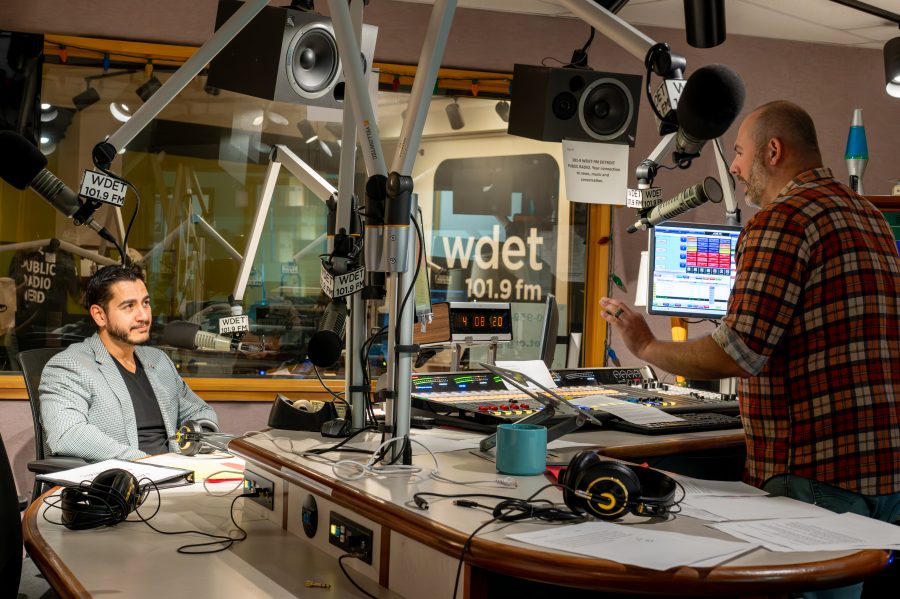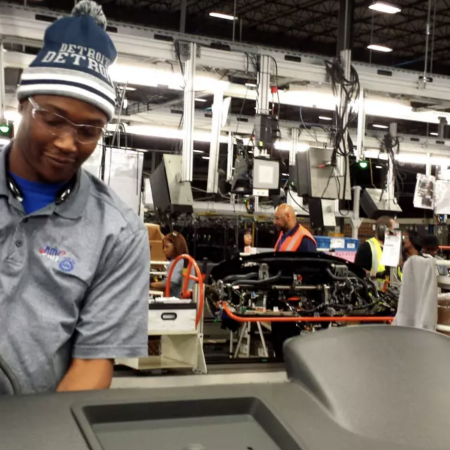‘I’ve been Abdul my whole life’: El-Sayed talks run for U.S. Senate
The field for the Democratic nomination for the U.S. Senate being vacated by Gary Peters is already crowded.
Congresswoman Haley Stevens and Michigan state senator Mallory McMorrow jumped in right away.
Abdul El-Sayed’s entry into the fray is not a surprise. An epidemiologist by trade, he served as health director for the City of Detroit – then ran for governor in 2018. He finished second in the primary to Gretchen Whitmer. El-Sayed picked up the most votes in Detroit.
El-Sayed returned to the world of public health and directed Wayne County’s health department. He resigned from that position in April to run for U.S. Senate.
In a conversation with Detroit Public Radio’s Russ McNamara, El-Sayed laid out his platform.
Listen: ‘I’ve been Abdul my whole life’: El-Sayed talks run for U.S. Senate
Challenging the system
“I want money out of politics, money back in your pocket, and Medicare for All,” El-Sayed said.
In short, there’s a brewing class war and politicians have made it too easy for people to become billionaires at the expense of the working class.
“The fundamental corruption of our politics has been the system that allows corporations and would be oligarchs and billionaires to buy politicians, who then rig the system so that corporations can charge you more for the things that you have to buy from them, and pay you less for the work that you have to do for them,” El-Sayed said.
El-Sayed says that means—much like his run for governor in 2018—that he isn’t taking money from corporations.
And despite his progressive credentials, El-Sayed claims he sees political challenges in a different framework.
“I don’t believe in left and right,” El-Sayed says. “I instead believe, ‘are you part of the system locking people out, or are you working for the people who want to unlock the system?’ For them, I’m focused on unlocking the system.”
“If you’re willing to have an honest conversation, if you’re willing to be truthful and direct and specific about what you want to do, people are willing to listen.”
‘I’ve been Abdul my whole life‘
El-Sayed says he understands that there are some people who won’t vote for him because he is Muslim.
“You get pretty good at explaining yourself, and I’ve learned that when people get past the name, they’re a lot more interested in what you have to say,” El-Sayed said.
He says he’s not about the change who he is, or his message.
“I’m the guy named Abdul who stood up and took on corporate polluters. I’m the guy named Abdul that helped to rewrite the state’s lead laws after Flint, when we had every school, daycare and head start in Detroit tested for lead in the water. I’m the guy named Abdul who put glasses on tens of thousands of kids faces,” El-Sayed said.
The Democratic Party and Gaza
One of the recurring threads to last year’s presidential election was the Biden Administration’s indifference to Israel’s ongoing military operation in Gaza. Vice President Kamala Harris largely refused to engage with Palestinians, and pro-Palestinian activists. At the Democratic National Convention, organizers refused to let a Palestinian speak.
On Tuesday, the United Nations Independent International Commission of Inquiry on the Occupied Palestinian Territory found that Israel was committing genocide in Gaza.

“I want our tax dollars to stop killing children,” El-Sayed said. “You don’t have to be a human rights expert to see the deaths of 18,500 kids, the attempt to render their homes unlivable, to destroy their parents lives and livelihoods and to ship them off into another place because they happen to speak the same language, and call that what it’s called.”
Polling has shown that people who identify as Democrats are largely against sending more bombs to Israel—something that is not reflected in party leadership.
“The fact that our party was on the wrong side of that obvious truth for a very long time is itself an indictment,” El-Sayed said.
El-Sayed says he has had many discussions about difficult subjects at campaign stops across the state.
“If you’re willing to have an honest conversation, if you’re willing to be truthful and direct and specific about what you want to do, people are willing to listen.”
Trusted, accurate, up-to-date.
WDET strives to make our journalism accessible to everyone. As a public media institution, we maintain our journalistic integrity through independent support from readers like you. If you value WDET as your source of news, music and conversation, please make a gift today.Donate today »
The post ‘I’ve been Abdul my whole life’: El-Sayed talks run for U.S. Senate appeared first on WDET 101.9 FM.

